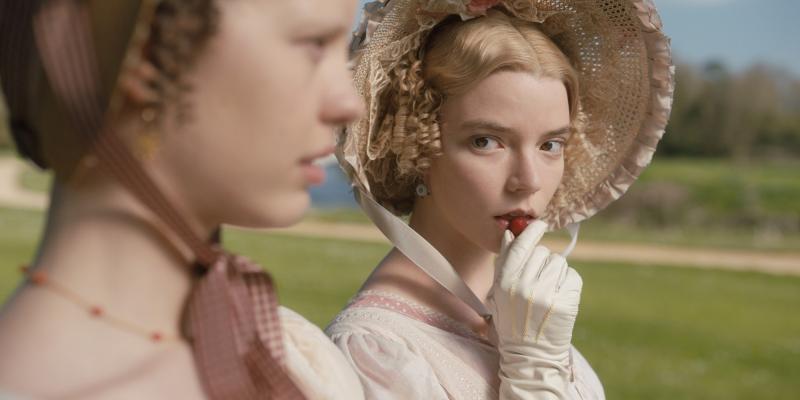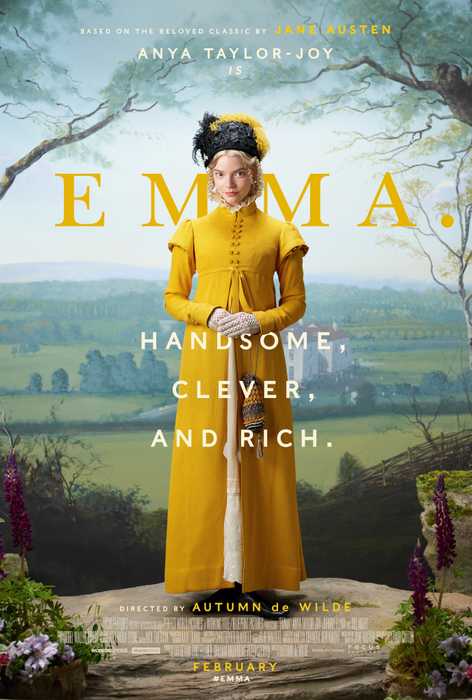Trailer Drops for Jane Austen's EMMA, in theaters February 2020

 Jane Austen is one of the most beloved authors in classic literature, and her novels are frequently read, turned into movies, and retold in new ways. While Pride and Prejudice remains everyone's favorite Austen novel, Emma is a close second.
Jane Austen is one of the most beloved authors in classic literature, and her novels are frequently read, turned into movies, and retold in new ways. While Pride and Prejudice remains everyone's favorite Austen novel, Emma is a close second.
The last Hollywood rendition of Emma was the 1996 adaptation starring Gwyneth Paltrow, which came on the heels of 1995's highly successful retelling Clueless starring Alicia Silverstone. On television, BBC most recently produced a new mini-series of Emma in 2009 starring Romola Garai. There was even a web series on YouTube in 2017 entitled The Emma Agenda, starring Selis Maria Vargas.
On February 21, 2020, Focus Features brings a new rendition of the classic tale to the big screen, starring Anya Taylor-Joy (The Witch, Split, Peaky Blinders). Johnny Flynn stars as George Knightley (Les Misérables, David Bowie: Stardust), with Mia Goth as Harriet Smith (Suspiria, A Cure for Wellness) and Callum Turner as Frank Churchill (War & Peace, Fantastic Beast: The Crimes of Grindelwald).
Check out the trailer now:
ABOUT EMMA:
Emma Woodhouse is a wealthy, exquisite, and thoroughly self-deluded young woman who has "lived in the world with very little to distress or vex her."
Jane Austen exercises her taste for cutting social observation and her talent for investing seemingly trivial events with profound moral significance as Emma traverses a gentle satire of provincial balls and drawing rooms, along the way encountering the sweet Harriet Smith, the chatty and tedious Miss Bates, and her absurd father Mr. Woodhouse-a memorable gallery of Austen's finest personages. Thinking herself impervious to romance of any kind, Emma tries to arrange a wealthy marriage for poor Harriet, but refuses to recognize her own feelings for the gallant Mr. Knightley. What ensues is a delightful series of scheming escapades in which every social machination and bit of "tittle-tattle" is steeped in Austen's delicious irony. Ultimately, Emma discovers that "Perfect happiness, even in memory, is not common."
Virginia Woolf called Jane Austen "the most perfect artist among women," and Emma Woodhouse is arguably her most perfect creation. Though Austen found her heroine to be a person whom "no one but myself will much like," Emma is her most cleverly woven, riotously comedic, and pleasing novel of manners.
Steven Marcus is Professor of English and Comparative Literature and George Delacorte Professor in the Humanities at Columbia University, and a specialist in nineteenth-century literature and culture. A fellow of both the American Academy of Arts and Sciences and the Academy of Literary Studies, he has received Fulbright, American Council of Learned Societies, Guggenheim, Center for Advanced Study in the Behavioral Sciences, Rockefeller, and Mellon grants. He is the author of more than 200 publications.
Emma, by Jane Austen, is part of the Barnes & Noble Classics series, which offers quality editions at affordable prices to the student and the general reader, including new scholarship, thoughtful design, and pages of carefully crafted extras. Here are some of the remarkable features of Barnes & Noble Classics:
- New introductions commissioned from today's top writers and scholars
- Biographies of the authors
- Chronologies of contemporary historical, biographical, and cultural events
- Footnotes and endnotes
- Selective discussions of imitations, parodies, poems, books, plays, paintings, operas, statuary, and films inspired by the work
- Comments by other famous authors
- Study questions to challenge the reader's viewpoints and expectations
- Bibliographies for further reading
- Indices & Glossaries, when appropriate
All editions are beautifully designed and are printed to superior specifications; some include illustrations of historical interest. Barnes & Noble Classics pulls together a constellation of influences-biographical, historical, and literary-to enrich each reader's understanding of these enduring works.
Comments

Videos
